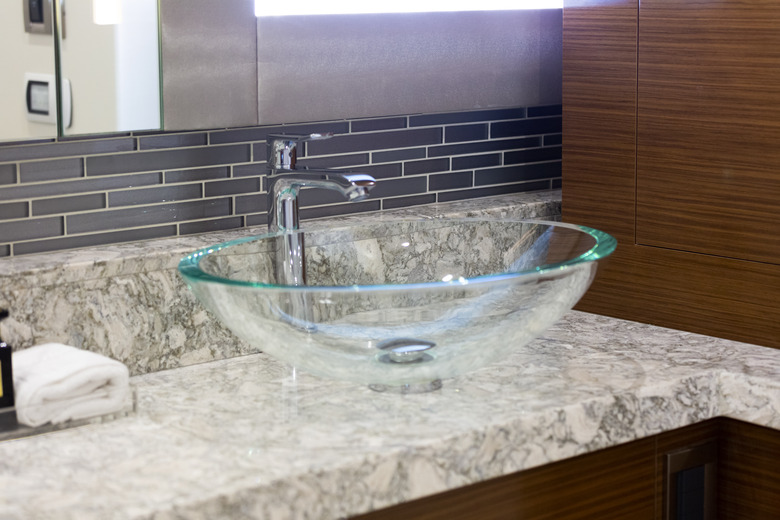How To Clean Hard-Water Spots On A Glass Vessel Sink
Hard water is a problem in many households, some more than others, but the ones with the biggest problem are those that get water from a well. That's because the minerals that cause whitish staining, such as calcium carbonate, magnesium hydroxide and calcium sulfate, are abundant in the earth's crust and in groundwater. Transparent, prominently placed fixtures, such as frosted glass other types of vessel sinks, are magnets for hard water deposits, and they highlight the stains and make them impossible to ignore.
If you're looking for advice on how to remove hard water stains from a vessel sink, it's probably because you've tried to scrub them off with soap and water and been unsuccessful. The reason soap and other conventional cleaners don't work is that the salts causing the stains are electrostatically bound to the glass. You need to dissolve the salts with an acidic cleaner such as vinegar or lemon juice.
The Chemistry of Mineral Deposits
The Chemistry of Mineral Deposits
Hard water contains an abundance of calcium and magnesium ions, which are positively charged particles that float freely in the water. These combine with other combinations of atoms that possess a negative charge to form insoluble salts, which happens especially efficiently in hot water, and the salts form a residue when the water has evaporated.
These ions and the salts they form are present to some degree in every water supply, but when there's a large concentration, a good way to deal with them is to install a water softener. A common working principle for water softeners is to pass the water through a bed of plastic beads and allow them to absorb the calcium and magnesium ions and replace them with sodium ions.
To clean deposits that have already formed, you need an acid to dissolve the salt since water won't wash it away. You could technically clean the deposits with hydrochloric or sulfuric acid, but there's no need for such a dangerous approach when weaker acids like vinegar and lemon juice or acidic cleaners such as CLR will do the job.
Using Vinegar or Lemon Juice to Clean a Glass Vessel Bowl
Using Vinegar or Lemon Juice to Clean a Glass Vessel Bowl
The hard water treatment you find most often online is a 50/50 mixture of vinegar and water, and a 50/50 solution of lemon juice and water comes in a close second. Put either of these solutions in a spray bottle and spray the spots. After about 10 minutes, you should be able to scrub them off with soap and water.
Because it takes these relatively weak acids time to do their work, you'll have to wait longer for heavy deposits and the solution may dry out. To prevent this, mix either solution with a pH-neutral powder, such as laundry detergent, flour or borax, to make a paste. Spread the paste on the stains and spray occasionally to keep it moist.
Cleaners who recommend this approach sometimes advise mixing vinegar with baking soda, but it's unlikely you'll have any luck if you use this mixture. Baking soda is alkaline and neutralizes the cleaning power of an acid. The best use of baking soda is for cleaning and neutralizing after treatment with vinegar or lemon juice.
How to Prevent Hard Water Spots
How to Prevent Hard Water Spots
The easiest and most effective way to prevent hard water spots from forming on a vessel sink is to wipe the sink dry after every use. If you have a family, you might not be able to manage that, but you should try to wipe it down at least once a day.
You might have trouble finding a specific water repellent for a glass sink, but if you want to protect the sink, spray it periodically with a windshield defogger. If hard water spots develop frequently on other fixtures besides the sink, you also might want to consider installing a water softening system.
